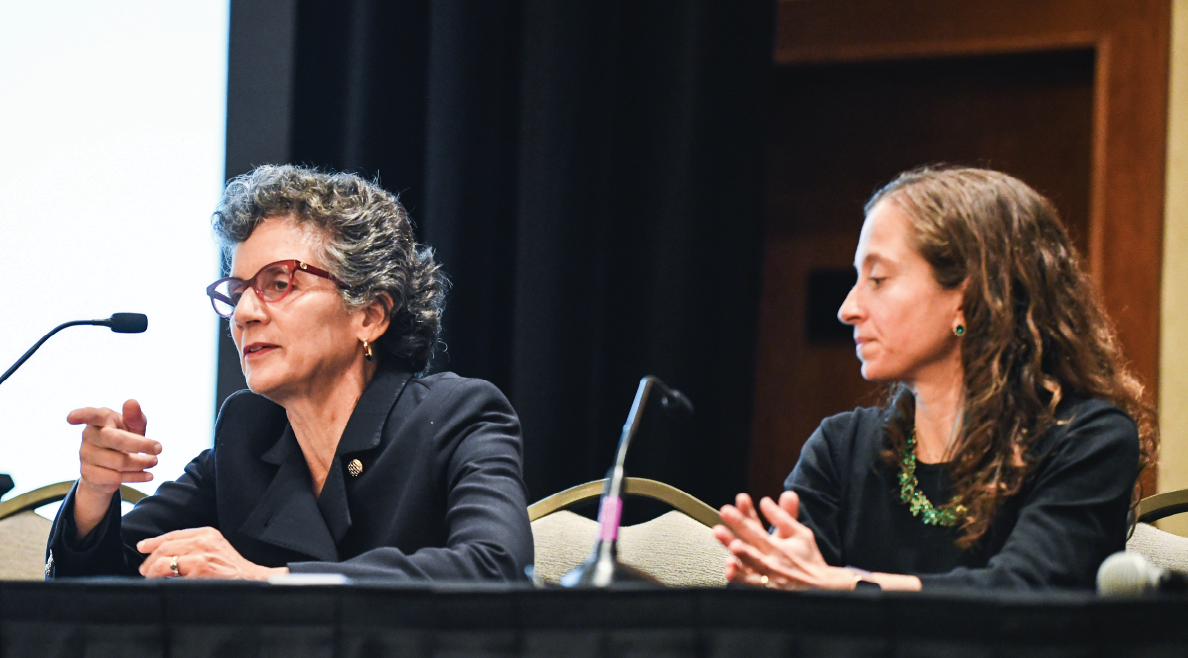ICHPS 2023 Offers Opportunity for Professional Growth, Innovative Thinking
Michael Baiocchi, Ruth Etzioni, Beth Ann Griffin, and Lisa Lix
The International Conference on Health Policy Statistics was held January 9–11 in Scottsdale Arizona. After three years off due to COVID-19, the meeting brought together practitioners, methodologists, health service researchers, health economists, and policy analysts. In addition to US and Canadian participants, ICHPS co-chairs Ruth Etzioni and Michael Baiocchi welcomed attendees from Israel, Japan, Europe, Australia, and South Africa.
The meeting kicked off with a welcome from Sally Morton, executive vice president of Arizona State University’s Knowledge Enterprise. This was followed by the opening keynote from Sherry Glied, dean of New York University’s Robert F. Wagner Graduate School of Public Service. Glied questioned how we might improve our processes for turning research data into evidence to inform policy. Serving as the discussant, Elizabeth Stuart—Bloomberg Professor of American Health and professor of biostatistics, mental health, and health policy and management at the Johns Hopkins Bloomberg School of Public Health—encouraged attendees to continue engaging in efforts to ensure their work can be communicated easily to stakeholders.
The closing keynote was delivered by Ziad Obermeyer from the University of California, Berkeley. He shared how he uses machine learning to identify over- and under-testing of heart attacks in the emergency room, zeroing in on errors in the prediction model and tracing them to their behavioral underpinnings.
Casey Ross, a national technology correspondent at STAT, took to the podium next. Ross is well known for his articles about artificial intelligence in medicine and issues of safety, fairness, and privacy.

Editors from top health policy journals discuss what they look for in statistically rigorous research. From left: John Wong, Sharon-Lise Normand, and John Ayanian.
Between the keynotes was a “meet the editor” session that brought together editors from medical and health policy journals to share their experiences, discuss the characteristics of successful submissions, and define what health policy statistics researchers should and should not do as they seek to disseminate their work in high-impact publications. The editors included John Ayanian from JAMA Health Forum, Sharon-Lise Normand of the New England Journal of Medicine and NEJM Evidence, and John Wong of the Annals of Internal Medicine. A major takeaway was that journals are recognizing the increasing need for sophisticated statistical methods, so health policy statisticians have more options than ever to disseminate their work.
ICHPS also included a special plenary session, titled “Reproductive Health Policy IS Public Health Policy.” This session addressed the profound consequences the Supreme Court’s ruling in Dobbs v. Jackson Women’s Health Organization will have on health care across the United States. J. Chris Carey, a retired obstetrician/gynecologist shared his experiences on the front lines of providing care for people seeking abortions. Amanda Jean Stevenson, a demographer who measures the effects of abortion policy on population health, gave the history of reproductive rights in the US and discussed how the use of and need for these services is estimated. The session addressed both the clinical and public health aspects of this acute and growing public health challenge.
On the afternoon of January 10, an anti-racism town hall led by Ofer Harel focused on what is needed for the American Statistical Association to become an anti-racist association and how specific methodological choices affect health policy research in this domain. Participants called out opportunities for health policy and health services researchers to advance the anti-racist research areas. To know more, email Harel.
The following day, David Etzioni—who is chair of surgery at the Mayo Clinic in Scottsdale and has an active research and administrative portfolio about the appropriate analysis, interpretation, and reporting of surgical outcomes data—gave attendees a close-up view from the trenches of health data generation. He focused on the process between the clinician’s orders and the appearance of the diagnosis or procedure code in the medical record. His conclusion? It’s not always pretty, and the quirks can be entirely institutional or network dependent.

The Mid-Career Award goes to Laura Anne Hatfield and Corwin Zigler, while the Long-Term Excellence Award goes to Joseph Cappelleri. From left: Laura Anne Hatfield and Joseph Cappelleri.
To close out the meeting, Lisa Lix, chair of the ASA Health Policy Statistics Section, presented the Mid-Career and Long-Term Excellence awards. The Mid-Career Award is presented to a recognized mid-career leader in health care policy and health services research who has made outstanding contributions through methodological or applied work and demonstrates promise of continued excellence at the frontier of statistical practice. Two were honored with this award this year: Corwin Zigler, associate professor in the department of statistics and data sciences at The University of Texas at Austin, and Laura Anne Hatfield, associate professor in the department of health care policy at Harvard Medical School.
The Long-Term Excellence Award is given to an individual who has made significant contributions to health care policy and health services research through mentoring and/or service that advances the aims of the Health Policy Statistics Section. This year’s award recipient is Joseph Cappelleri, executive director of biostatistics at Pfizer and adjunct professor at Brown University, Tufts Medical Center, and the University of Connecticut. The award recognizes his research, education, and service contributions to the statistical and health policy communities, with an emphasis on patient-reported outcomes and measurement science.

Students and mentors get to know each other and share questions and stories during the student lunch. Michael Baiocchi (seated, center)
ICHPS also provides learning and networking opportunities for those new to health policy. In addition to honoring 11 students with travel awards, the conference provides a venue for students and developing scholars to network and engage with leading methodologists via poster sessions, a student luncheon, and roundtable sessions. The student lunch brought together dozens of students and mentors. Mentors were drawn from academia, government, and industry and shared their candid experiences and thoughts about career development. Students also received a reduced conference registration rate, and all workshops were free for students.
The next conference will take place in January of 2025 and be co-chaired by Beth Ann Griffin and Lane Burgette.


















